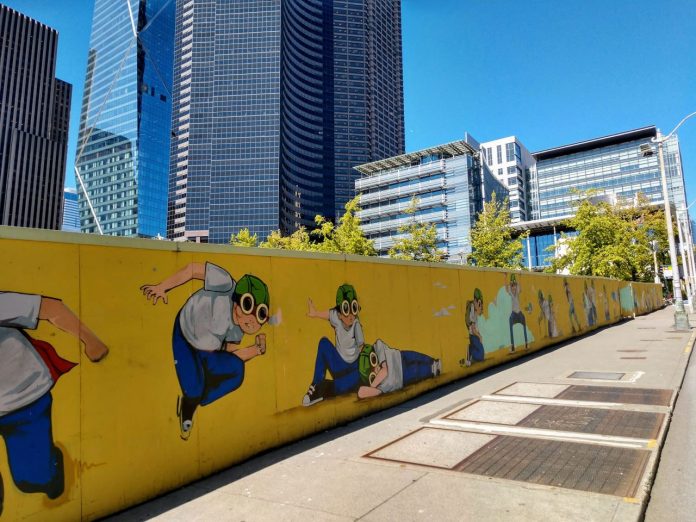
Let’s imagine what the Seattle City Council could be doing right now… if they hadn’t sworn off progressive innovation.
There are a lot of new sounds over at Seattle City Hall these days. The sound of legislative staff trudging back to the office for mandatory in-person work. The sound of protesters being arrested for getting too rowdy outside council chambers. The sound of councilmembers asking questions while their aides leaf frantically through budget books seeking “efficiencies” and “redundancies.” And, I assume, the sound of staff in the various departments speculating in hushed tones about whether those redundancies will be their jobs.
One sound you don’t hear anymore? The click-clack of computer keys turning bold progressive policy ideas into new legislation.
That’s a major shift from the past decade-plus at City Hall, and it’s hard to even describe it in politically neutral terms. Danny Westneat offered one take, quoted approvingly by Council President Sara Nelson:
“Ideological experimentation was for pre-pandemic. But during the pandemic, city life kind of went to hell. So now people just want stuff that works.”
Reading that, you’d think the policy achievements of that era were frivolous or symbolic. But I’m not sure what’s “ideological” about the $2.9 million Chipotle will be paying out to Seattle workers for allegedly violating the city’s sick leave and secure scheduling ordinances. Or about the very civilized six months’ advance notice I got of my most recent rent increase, thanks to Seattle’s renter protection laws. Or about the thousands of affordable housing units already being built by the JumpStart big business tax, which also saved the City from having to make painful cuts in the deepest dark of the pandemic. Those are tangible results.
"Ideological experimentation was for pre-pandemic. But during the pandemic, city life kind of went to hell. So now people just want stuff that works."
— Sara Nelson (@CMSaraNelson) March 30, 2024
Hot take: The ‘move to the right’ isn’t done yet in West Coast cities https://t.co/UWHujI8sRj via @seattletimes
Some of Seattle’s progressive lawmaking might truly be called “experimental” in the sense of implementing policies before any other city — in our country and in our era, at least. But it was also a response to the ways in which city life had already gone to hell: not for Westneat, of course, or for others of his demographic, but for low-wage workers, for renters, for people in the poorest quintile who found themselves overtaxed and left behind in a hostile economy “disrupted” by tech giants that were running their own experiments on our city.
And guess what? There’s plenty that’s broken in Seattle these days, but these laws? They’re some of the stuff that’s actually working well.
Terminology aside, we can all agree that this particular era of progressive experimentation is over. Our new city leadership is busy filling potholes, sweeping tents, hiring cops (or trying to), and hastily preparing to roll back Seattle’s new minimum wage law for delivery app workers — a prelude, I fear, to “revisiting” other good works of their predecessors.
Many of those who applaud this turn must hope that Seattle politics are now back to normal after an aberrant decade — all the fault of Kshama Sawant, maybe. I predict they’ll be disappointed. Why? Because the big problems that prompted that progressive era — the housing and homelessness crisis, the climate crisis, growing disparities of wealth and power, among others — are still with us, and the centrists now in charge don’t have any real answers. They could make things much worse, as they happen to be governing at a key moment: crafting an eight-year transportation levy, shaping the next 20 years of our city’s growth plan, and responding to a looming $230 million budget gap. At some point, Seattle voters are going to decide they want their leaders to do visionary stuff again.
But in the meantime, here we are, for who knows how long. But that doesn’t mean we can’t dream about what Seattle could be doing. And there are good reasons to do so. We can learn from other cities, as other cities have learned from us. We can develop our visions of what Seattle could be, visions that can inspire candidates and voters as progressives work on turning things around over the next few election cycles. Plus, the legislative process isn’t our only option to get things done: there’s always the citizen’s initiative.
So here at The Urbanist, I’ll be writing about some of the policies other cities are implementing or considering to address the problems they (and we) face, and to become and create great places for people of all incomes, races, ages, and abilities. Are there ideas you think I should dig into? Let me know.
Of course, not all innovation takes the form of shiny new policies. Some long-standing goals of Seattle urbanists and progressives — pedestrianizing Pike Place and The Ave, for example — seem maddeningly simple, but have foundered time and again on the political shoals, and for reasons more complicated than who’s in City Hall. Have organizers in other cities gotten creative with politics, power, and process and succeeded where Seattle has so far failed?
Don’t believe the hype. There are still experiments going on at City Hall these days, whether it’s throwing money at an ineffective technology like ShotSpotter or contemplating housing subsidies for cops. And guess what? They’re no less ideological than what came before. Seattle progressives might be playing defense for now, but we should keep thinking big. Let’s stockpile an arsenal of stuff that works so we’re ready to roll when this latest phase of ideological experimentation has run its course.
Katie Wilson is General Secretary of the Transit Riders Union, a Seattle-based organization advocating for improving transit quality and making access more equitable. In 2025, she launched a run for Seattle Mayor.

